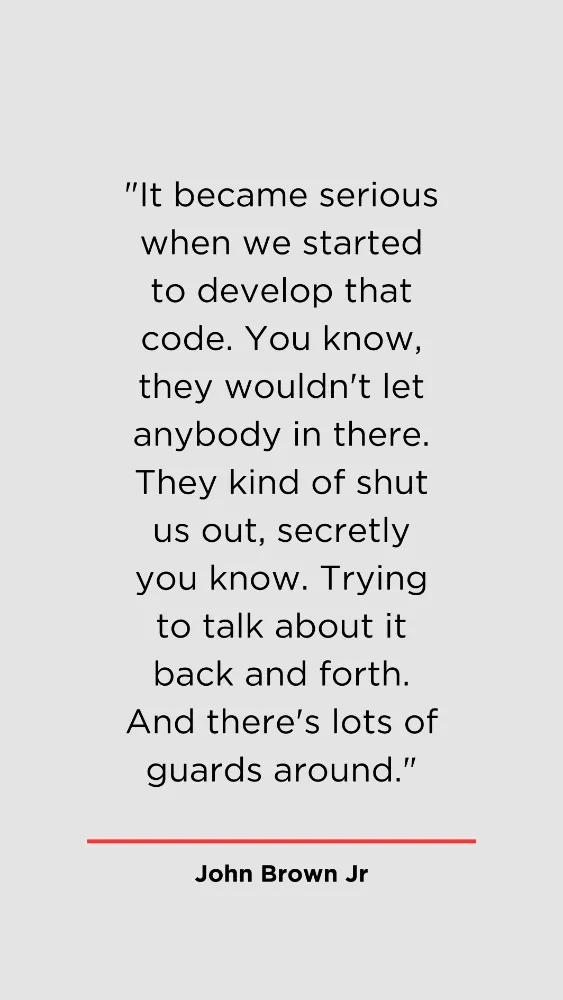John Brown Jr may not have achieved the same level of notoriety as his father, but his journey through the challenging times of the 19th-century American abolitionist movement is a compelling story that deserves recognition.
The stark contrast between the father’s and son’s approaches highlights the diversity of strategies within the abolitionist movement. However, this contrast should not diminish the importance of John’s contributions, which offer a compelling alternative narrative in the struggle to end one of American history’s most morally reprehensible institutions.
In the following sections, we will delve into the life of Brown from his upbringing in a deeply religious family to his tireless efforts in the Underground Railroad and his collaborative work with other notable abolitionists.
Through this exploration, we will uncover a multifaceted activist who chose compassion and nonviolence in the pursuit of freedom and equality for all.
Divergent Paths: Violence vs. Non-Violence
Growing up in the Brown household was a unique experience for young John. His childhood home was steeped in the fervent discussions and unwavering convictions of the abolitionist movement.
From an early age, his family instilled in him the values of justice, equality, and the immorality of slavery. These teachings shaped his core beliefs. Undoubtedly, he influenced his son, although they vastly differed in their abolitionist methods.
John Brown, Jr. witnessed firsthand the fiery determination of his father. He believed that armed insurrection was necessary to bring an end to the institution of slavery. This early exposure to radical activism had a profound impact on John Brown. Moreover, it compelled him to seek an alternative path that he believed would lead to lasting change. The kind of change without the bloodshed and violence that often accompanied his father’s actions.
John Brown Jr and His Peaceful Abolitionist Activism
Despite his limited formal education, John Brown Jr possessed an insatiable thirst for knowledge. He devoured books, voraciously absorbing the writings of abolitionist thinkers. He learned from philosophers and theologians who shared his passion for justice.
His self-education broadened his intellectual horizons and sharpened his ability to articulate the moral imperative of abolishing slavery.
The influence of his family’s devout Calvinist faith cannot be overstated. In the Brown household, the principles of Calvinism were more than just religious doctrine; they were a guiding force in shaping their worldview.
The Calvinist tradition, which emphasized predestination and the moral duty to confront evil actively, resonated deeply with John Brown, Jr. These tenets provided the moral foundation upon which his unwavering commitment to the abolitionist cause was built.
For John Brown Jr, slavery was not merely a political issue or a matter of economics; it was a grave moral evil that demanded immediate eradication.
His faith-driven belief in the inherent worth and dignity of all individuals, regardless of race, compelled him to dedicate his life to the abolitionist struggle.
Participation in the Underground Railroad
John Brown, Jr.’s commitment to the abolitionist cause took on a deeply personal and courageous dimension. It became possible through his involvement in the Underground Railroad. He played an essential role in the network that helped enslaved individuals. They help them escape the horrors of bondage and find their way to freedom.
Their home in Akron, Ohio, was a beacon of hope for countless fugitives. Amid the perilous journey to liberty, the Browns’ residence became a sanctuary. They lovingly offered shelter and sustenance. This sense of compassion must have been incredibly rare in a world marked by the cruelty of slavery.
The Browns provided a vital link in the chain of this clandestine network. It ensured that escaped enslaved people could find refuge and guidance on their path to freedom.
The courage and compassion demonstrated by John Brown Jr and Mary not only transformed the lives of those they helped. It also influenced the broader campaign to bring an end to slavery.
The Civil War and John Brown Jr
When the American Civil War broke out in 1861, John Brown Jr. saw it as a validation of the abolitionist cause to which he had dedicated his life. He fervently supported the Union war effort and saw the conflict as an opportunity to end slavery.
During the war, he served as an agent for the United States Sanitary Commission, an organization dedicated to improving the welfare of Union soldiers.
His fervent support for the Union war effort reflected his dedication to this cause. He saw the conflict as an opportunity to translate the ideals of freedom and equality.
In a nation deeply divided, John Brown, Jr. saw the potential for a united front against the institution of slavery.

A Legacy of Abolitionist Principles
John Brown, Jr.’s passing on December 2, 1895, marked the end of a life dedicated to principles he held dear to his heart. Even after his death, his commitment to peaceful activism and the abolitionist cause continued to shine like a beacon of hope and inspiration. His legacy is a testament to the enduring power of non-violent resistance in the face of systemic injustice, and it also reflects the profound veteran experiences that shaped his unwavering dedication.
In many ways, John Brown, Jr. emerged as an unsung hero of the abolitionist movement, with his quieter yet equally resolute efforts deserving recognition. His father, John Brown Sr., often dominates the historical narrative. However, we should not overlook John Brown, Jr.’s significant contributions, particularly the Veteran experiences that informed his approach and strengthened his resolve.
Courageous Stance against Injustice
In a nation torn apart by the moral dilemma of slavery, John Brown, Jr. exemplified the courage to stand against injustice. He expressed compassion to aid those in need. Moreover, his commitment to peaceful abolitionism reminds us of many paths to achieving social change. Furthermore, his legacy inspires those who work toward justice and equality today.
John Brown, Jr.’s contributions to the abolitionist movement speak to the power of individuals to make a difference.











